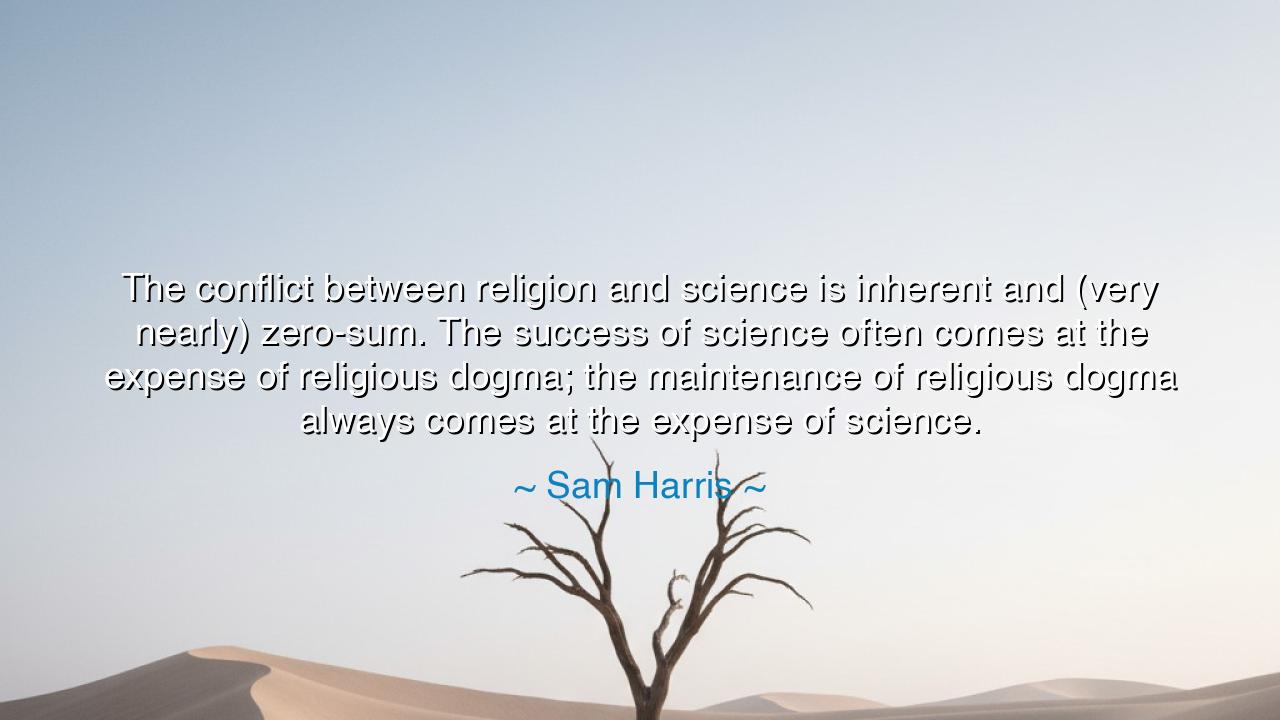
The conflict between religion and science is inherent and (very
The conflict between religion and science is inherent and (very nearly) zero-sum. The success of science often comes at the expense of religious dogma; the maintenance of religious dogma always comes at the expense of science.






Sam Harris, fierce critic and seeker of reason, once declared: “The conflict between religion and science is inherent and (very nearly) zero-sum. The success of science often comes at the expense of religious dogma; the maintenance of religious dogma always comes at the expense of science.” In this sharp utterance he names a struggle as old as thought itself—the battle between dogma and discovery, between what is fixed and what seeks to unfold. His words strike with the weight of warning: that when one rises, the other is often forced to retreat.
The meaning of this quote lies in the tension between two great powers. Science is the method of questioning, observing, and unveiling the laws of the universe. It is a path of doubt, trial, and evidence. Religion, when reduced to dogma, is the demand to accept without question, to bow before inherited truths and forbid challenge. Harris does not condemn the spiritual impulse, but the rigid maintenance of dogma, which resists the light of inquiry. Thus he says the conflict is “inherent”: for wherever discovery threatens sacred assumptions, war is kindled between curiosity and creed.
History gives us countless examples of this clash. Think of Galileo, who turned his telescope toward the heavens and declared that the earth moved around the sun. His science was clear, his evidence undeniable, yet the religious dogma of the age condemned him, silenced him, and sought to hold the earth in its place at the center of creation. Here we see Harris’s truth embodied: the success of science came at the expense of religion’s dogma, and the preservation of dogma came at the expense of truth.
Or think of Charles Darwin, who revealed the law of natural selection. His work shook the foundations of creationist belief. For many, the beauty of evolution expanded the wonder of creation itself. Yet for others, it was seen as an assault upon the scriptures, and they fought to maintain their dogma by suppressing the science. In schools, in courts, in pulpits, the struggle raged. And still today, the conflict endures—proof of Harris’s claim that the contest is nearly zero-sum, that victory for one often feels like defeat for the other.
But, O listener, Harris’s words also conceal a challenge to humanity: must this conflict remain eternal? Perhaps not. For there are those who, rejecting dogma, find in science a pathway to awe, a reverence akin to worship. They see the cosmos revealed by telescopes, and they call it divine. They see the elegance of DNA, and they hear in it the poetry of life. In such hearts, the quarrel softens—not because science has bent, nor because faith has silenced inquiry, but because wonder itself bridges the divide.
Yet his warning stands: so long as religion clings to dogma rather than spirit, it will resist discovery. And so long as men worship certainty more than truth, they will choose ignorance over illumination. Harris’s words remind us that the danger is not in belief itself, but in the refusal to let belief evolve. Dogma frozen in time will always stand in conflict with the flowing river of discovery.
The lesson is clear: do not fear the light of inquiry. If your faith is true, it will not be shattered by evidence; if your science is honest, it will not be threatened by mystery. Honor both the spirit of reverence and the discipline of discovery, but cast aside the chains of dogma. For the destiny of mankind lies not in the defense of ignorance, but in the courage to know.
Practical wisdom flows from this: question boldly, read widely, and test every claim, even your own. Respect the mystery of existence, but never use it to silence the pursuit of knowledge. Let science guide your understanding of the world, and let wonder guide your heart. In this way, the conflict Harris describes may yet become a dialogue, where discovery does not kill reverence, and reverence does not blind discovery.
So remember, O children of tomorrow: the conflict between religion and science is inherent only when faith is chained to dogma. Free the spirit, embrace the light of knowledge, and you will find that the universe is wide enough for both reason and wonder. In that union, mankind will not only survive, but ascend.






AAdministratorAdministrator
Welcome, honored guests. Please leave a comment, we will respond soon